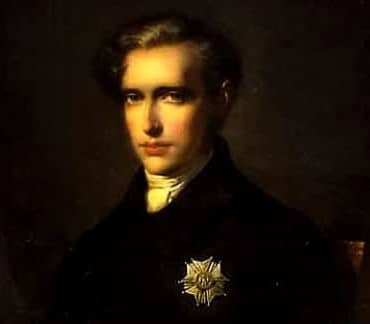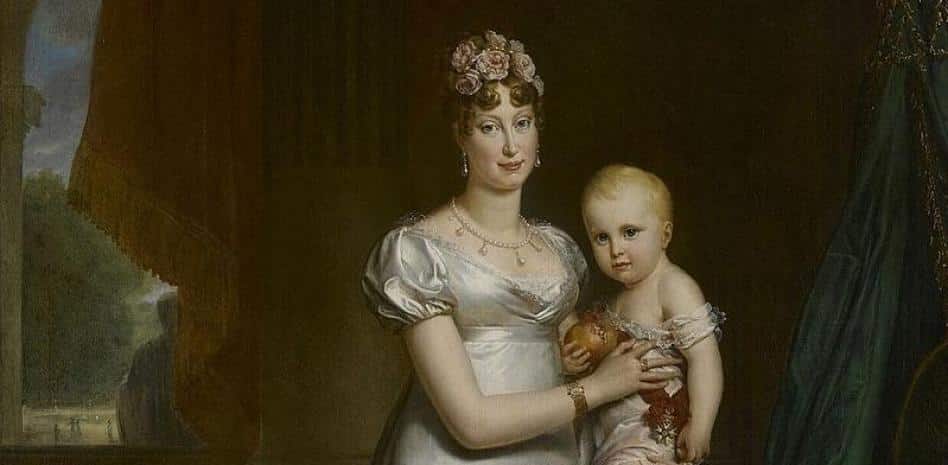On December 15, 1940, a silent procession left the Parisian Gare de Austerlitz in the direction of the Invalides complex. In the center of the procession, a military harmonon carried the coffin of the once ephemeral emperor of the French: Napoleon II.
In an effort to repair a historical grievance, and wishing to ingratiate himself with occupied France, Hitler had ordered the opening of the Capuchin Crypt in Vienna, taking the remains of the Napoleon’s son and taking them to Paris to rest, along with those of his father, under the dome of the old military hospital of the Invalides.
It was the sad fate of Napoleon II. To be just a shadow of his mighty father. A destiny that, in front of the Imperial Eagle, as the first Bonaparte was known, only allowed him to be “the Eaglet”, the nickname that was given him posthumously.
In search of an heir
The great love in the life of Napoleon Bonaparte was Joséphine de Beauharnais. His second marriage to Marie Louise of Austria was simply a trick to get the heir that Joséphine could not give him.
In 1810, the emperor had had a male child, Alexander, from his love affairs with the Polish countess Marie Walewska, but had been registered as the son of the countess’s husband.
On the other hand, it was convenient that the imperial heir was linked to a royal house of solera.
After divorcing Joséphine, he chose archduchess Marie Louise, daughter of the Emperor of Austria, as his wife.
The truth is that France agreed in its rejection of Napoleon’s new marriage, although for different reasons.
The French clergy did not approve of divorce from the emperor. For the republicans, Marie Louise was not more than the niece of “the Austrian”, Marie Antoinette, the hated guillotined queen.
The royalists disapproved of a wedding that gave a certain dynastic legitimacy to the Bonaparte family. And the people closest to the emperor declared themselves determined supporters of Joséphine.
Most of the reluctance disappeared on March 20, 1811, when the couple’s first child was born in the Tuileries.
Napoleon, at last, had an heir. The French Senate awarded the newborn the title of King of Rome (if he had been a girl, the title would have been Princess of Venice). This title was added to that of Prince Imperial provided for by the Napoleonic Constitution.
A legion of nurses, military tutors and instructors would be in charge of supervising Napoleon II’s training.
Although that Marie Louise wrote to her mother: “I am sure that in Vienna I could have enjoyed my son much more”.
Throughout his life little Napoleon did not enjoy the company of his parents much. In May 1812, when the emperor began the Russian campaign, Marie Louise accompanied him to Dresden, but the boy remained in Paris.
It was the beginning of the end of the Empire. Paris would be occupied in March 1814, a few months after the French defeat at Leipzig.
In April, Napoleon was deposed by the Senate and, following the advice of his marshals, abdicated to his son. The king of Rome became Napoleon II, a fleeting title , since eight days later the Treaty of Fontainebleau was signed between Napoleon and the representatives of the three monarchies of the Holy Alliance: Austria, Russia and Prussia.
For him, Bonaparte renounced sovereignty over his domains, both for himself and for his family, while Marie Louise was granted the Italian duchies of Parma, Piacenza and Guastalla, which in the future should be inherited by the king of Rome.
A week later, Napoleon Bonaparte left for the island of Elba. He did not see his son again.

From Napoleon to Francis
Months before, Napoleon had written to his brother Joseph that he would rather see his son dead than become an Austrian prince.
However, father at last, while leaving for exile, forced his wife to write a letter to Francis I of Austria requesting protection for her and her little one.
Francis did not deny him his help. Marie Louise and the child left for Vienna. Immediately, under Chancellor Metternich, a painstaking operation was launched which, as his father feared, was destined to transform Napoleon II into a Viennese archduke .
It began by making him forget his first name to be renamed Francis (Franz), like his grandfather, and just after seven years he was granted the title of Duke of Reichstadt , in order to obviate any reference to his previous status as prince imperial.
By then, in 1818, his mother was also not by his side. The Congress of Vienna had granted Marie Louise the ownership of the Italian duchies granted at Fontainebleau. However, she only did so for life. Therefore, young Napoleon could not inherit them.
The once empress moved to Italian lands to carry out the government of her possessions. Not even during the brief imperial dream of the Hundred Days, with the return of Bonaparte to France from Elba, had Marie Louise considered the possibility of returning to Paris.
His situation did not change either when the Battle of Waterloo definitively sentenced the Napoleonic Empire, sending Napoleon Bonaparte to Santa Elena .
The legend is born
Thus, the Duke of Reichstadt grew up as an orphan of a father and with a mother whose presence was solely epistolary. He was compensated for his loneliness by the special predilection that his grandfather, Francis, felt for him.
Nobody forgot that, after his abdication in 1815, Bonaparte had proclaimed: “My political life is ending, and I name my son, under the title of Napoleon II, Emperor of the French”.
It had been, once again, a fleeting appointment. But, as a result, the young Napoleon was viewed by the Allied powers as a potential enemy for Restoration Europe. It needed to be controlled, and Chancellor Metternich saw to it.
The counterpart was, evidently, the meaning that his figure had for the French Bonapartists, for whom Napoleon II became the symbol of the freedoms hijacked by absolutism.
Many authors affirm that the greening of the Napoleonic fervor that led to the creation of the Second Empire has its origin in the legend that surrounded the figure of the Duke of Reichstadt (Napoleon II) in France.
A natural death?
The liberal revolution of 1830 could have been a golden occasion for Napoleon II to realize the ambitions of many Bonapartists in his person.
But by then tuberculosis had already wreaked havoc on the young archduke, who, on the other hand, never declared on a possible return to France. In any case, Louis Philippe I would be the one to take over the throne.
The terrible physical decline of a boy who was only 19 years old quickly put the rumor mill into action, and in the French liberal ranks he was considered one more victim of Metternich’s Machiavellian intentions.
The suspicion that he was poisoned was sustained years later by various authors , but current medicine denies it.
In the spring of 1832, what seemed like a persistent cold struck the Duke of Reichstadt again. The rapid evolution of the disease, a rampant tuberculosis, meant that at the beginning of May the young man was no more than skin and bones and barely stood.
Even ruled out the possibility of poisoning, Metternich was guilty of the haste with which events unfolded.
For several years, Marie Louise had insisted that her son be allowed to travel to Italy, convinced that the mild Mediterranean climate would strengthen his delicate lungs. But the chancellor always refused. He feared what might happen if Napoleon II crossed the Austrian border.
In his defense it should be argued that, possibly, Metternich did not forget the words written by his eternal enemy, Napoleon, before he died: “My son must think about avenging my death in exile, but he must also take advantage of it. Let him direct his efforts to reign. May it grow all that I have sown ”.
Napoleon should have sensed that Metternich was willing to do anything to save his ideal of absolute monarchy.
On July 22, 1832, Napoleon II, or the Duke of Reichstadt, died at Schönbrunn.
However, Napoleon II continued to flap many years later. And not only in Bonapartist aspirations, but also on stage and in literature.
Various authors were fascinated by the romantic halo and mystery that surrounded it, among them Edmond de Rostand. In 1900 he wrote a drama entitled L’Aiglon that was kept on stage for a long time.
The work rekindled the memory of a figure as fragile as it was imposing, in its symbolism, for those who wanted to regenerate in him the myth of Bonaparte.
The witness would be collected by his cousin, Charles-Louis Napoléon Bonaparte, son of Louis Bonaparte (brother of Napoleon Bonaparte) and Hortense Beauharnais (daughter of Joséphine’s first marriage).
He would be able to establish the Second Empire and rule it as Napoleon III.
Source: Historia y Vida






